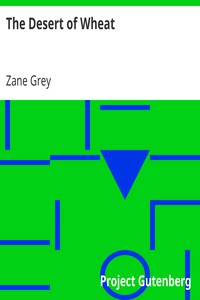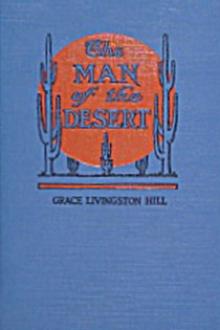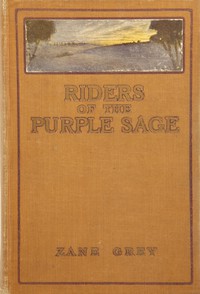The Desert of Wheat, Zane Grey [good non fiction books to read .TXT] 📗

- Author: Zane Grey
Book online «The Desert of Wheat, Zane Grey [good non fiction books to read .TXT] 📗». Author Zane Grey
"Phew! The Golden Valley never seen dust like this in a million years!… I'm chokin' for water. An' listen to the car. She's boilin'!"
Then, as he stepped toward Kurt, the rancher showed himself to be a well-preserved man of perhaps fifty-five, of powerful form beginning to sag in the broad shoulders, his face bronzed by long exposure to wind and sun. He had keen gray eyes, and their look was that of a man used to dealing with his kind and well disposed toward them.
"Hello! Are you young Dorn?" he asked.
"Yes, sir," replied Kurt, stepping out.
"I'm Anderson, from Ruxton, come to see your dad. This is my girl Lenore."
Kurt acknowledged the slight bow from the veiled young woman, and then, hesitating, he added, "Won't you come in?"
"No, not yet. I'm chokin' for air an' water. Bring us a drink," replied Anderson.
Kurt hurried away to get a bucket and tin cup. As he drew water from the well he was thinking rather vaguely that it was somehow embarrassing—the fact of Mr. Anderson being accompanied by his daughter. Kurt was afraid of his father. But then, what did it matter? When he returned to the yard he found the rancher sitting in the shade of one of the few apple-trees, and the young lady was standing near, in the act of removing bonnet and veil. She had thrown the linen coat over the seat of an old wagon-bed that lay near.
"Good water is scarce here, but I'm glad we have some," said Kurt; then as he set down the bucket and offered a brimming cupful to the girl he saw her face, and his eyes met hers. He dropped the cup and stared. Then hurriedly, with flushing face, he bent over to recover and refill it.
"Ex-excuse me. I'm—clumsy," he managed to say, and as he handed the cup to her he averted his gaze. For more than a year the memory of this very girl had haunted him. He had seen her twice—the first time at the close of his one year of college at the University of California, and the second time on the street in Spokane. In a glance he had recognized the strong, lithe figure, the sunny hair, the rare golden tint of her complexion, the blue eyes, warm and direct. And he had sustained a shock which momentarily confused him.
"Good water, hey?" dissented Anderson, after drinking a second cup. "Boy that's wet, but it ain't water to drink. Come down in the foot-hills an' I'll show you. My ranch 's called 'Many Waters,' an' you can't keep your feet dry."
"I wish we had some of it here," replied Kurt, wistfully, and he waved a hand at the broad, swelling slopes. The warm breath that blew in from the wheatlands felt dry and smelled dry.
"You're in for a dry spell?" inquired Anderson, with interest that was keen, and kindly as well.
"Father says so. And I fear it, too—for he never makes a mistake in weather or crops."
"A hot, dry spell!… This summer?… Hum!… Boy, do you know that wheat is the most important thing in the world to-day?"
"You mean on account of the war," replied Kurt. "Yes, I know. But father doesn't see that. All he sees is—if we have rain we'll have bumper crops. That big field there would be a record—at war prices.… And he wouldn't be ruined!"
"Ruined?… Oh, he means I'd close on him.… Hum!… Say, what do you see in a big wheat yield—if it rains?"
"Mr. Anderson, I'd like to see our debt paid, but I'm thinking most of wheat for starving peoples. I—I've studied this wheat question. It's the biggest question in this war."
Kurt had forgotten the girl and was unaware of her eyes bent steadily upon him. Anderson had roused to the interest of wheat, and to a deeper study of the young man.
"Say, Dorn, how old are you?" he asked.
"Twenty-four. And Kurt's my first name," was the reply.
"Will this farm fall to you?"
"Yes, if my father does not lose it."
"Hum!… Old Dorn won't lose it, never fear. He raises the best wheat in this section."
"But father never owned the land. We have had three bad years. If the wheat fails this summer—we lose the land, that's all."
"Are you an—American?" queried Anderson, slowly, as if treading on dangerous ground.
"I am," snapped Kurt. "My mother was American. She's dead. Father is German. He's old. He's rabid since the President declared war. He'll never change."
"That's hell. What 're you goin' to do if your country calls you?"
"Go!" replied Kurt, with flashing eyes. "I wanted to enlist. Father and I quarreled over that until I had to give in. He's hard—he's impossible.… I'll wait for the draft and hope I'm called."
"Boy, it's that spirit Germany's roused, an' the best I can say is, God help her!… Have you a brother?"
"No. I'm all father has."
"Well, it makes a tough place for him, an' you, too. Humor him. He's old. An' when you're called—go an' fight. You'll come back."
"If I only knew that—it wouldn't be so hard."
"Hard? It sure is hard. But it'll be the makin' of a great country. It'll weed out the riffraff.… See here, Kurt, I'm goin' to give you a hunch. Have you had any dealin's with the I.W.W.?"
"Yes, last harvest we had trouble, but nothing serious. When I was in Spokane last month I heard a good deal. Strangers have approached us here, too—mostly aliens. I have no use for them, but they always get father's ear. And now!… To tell the truth, I'm worried."
"Boy, you need to be," replied Anderson, earnestly. "We're all worried. I'm goin' to let you read over the laws of that I.W.W. organization. You're to keep mum now, mind you. I belong to the Chamber of Commerce in Spokane. Somebody got hold of these by-laws of





Comments (0)